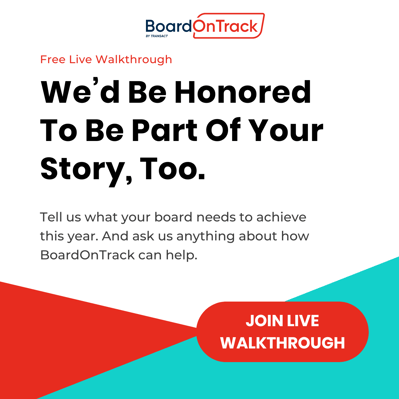Can you talk a little bit about the nature of your board-CEO partnership?
YBK: My board chair and I usually meet a few weeks before board meetings to take a look at the board agenda.
We’ll ask ourselves: What are our current goals? What are we working on? What do we need to bring back to our upcoming board meeting?
Because we have those regular one-to-one meetings before our board meetings, I feel like she’s really supportive of where we are as an organization. It’s amazing — even in between meetings, she’ll pick up the phone and say, ‘Hey, I just thought this.’ It’s just very comfortable.
How has BoardOnTrack helped your board?
YBK: BoardOnTrack has helped us, hands down, because of several things: the networking between our board and other boards, help staying organized with our board meetings and planning and getting our calendars structured; and the access to training resources and ongoing professional development.
The training resources help my board to grow its learning and understanding of what it means to be a board member. And it empowers me as a CEO.
BoardOnTrack has helped in being able to add on board members for our board. We can step back and reflect — who’s on the bench. It’s been really helpful to have a reflective practice and a systematic way of thinking through how to look at what’s on the board and where do we need to go in the future.
And it’s helped with onboarding those new board members. You get used to working with the board members who have been with you. And then, we’ve got to start over again with this new board member — how do we bring them up to where the current board is?
We have continuity through leadership transitions. I’m now on my third board president. And there hasn’t been a loss of documents. There is a history, we can look things up.
“Having BoardOnTrack really helps me to stay organized with my board, and make sure our meetings are effective. ”
-Yvette King-Berg, Executive Director, YPICS
Part of being a great charter school board is making sure that you’re just bottom-line compliant with the law and following the Brown Act. Often times, simple things, like processes and lack of fiscal accountability, can cause charter schools to close.
Going through audits has been wonderful with BoardOnTrack versus going through audits prior to not having access to BoardOnTrack. If I’m in the middle of an audit, to not have to go back and re-find all of the minutes that addressed a particular issue.
And I’m not on my board members all the time about when the next meeting is, or if they’re ready. I’m not having to run around and find the secretary, figuring out who wrote the minutes and put them somewhere else. It’s just all where it needs to be.
And when they’re having committee meetings, they know how to go into the system and make sure that they’re running their meetings right.
And if we’re starting a new committee and we need to think about the roles of that committee, it’s nice to be able to go to the resource library and have access to that.
“BoardOnTrack helps us leverage information, documentation, accountability, and manage the bottom line. It’s the history of the organization.”
-Yvette King-Berg, Executive Director, YPICS
How do you ensure your committees are active and getting the right work done?
YBK: We now have a couple of committees that are really active. They’re meeting in between board meetings. And at the full board meetings, it’s not just me reporting out; it’s also the chairs of those committees reporting out on their work.
And I don’t feel like I’m responsible for everything. They’re keeping track of their minutes within the BoardOnTrack system, like we do for our regular board meeting. It’s a place for them to kind of handle everything.
And when they set up their meetings, BoardOnTrack sends out meeting reminders to their committee members. It helps them to stay organized and to actually perform their committee member responsibilities with a lot of ease, instead of it being overly complicated.
“Our board members are volunteers. If they’re having to keep track of everything, it’s too much. It’s so nice to have one place where everything’s there. ”
-Yvette King-Berg, Executive Director, YPICS



